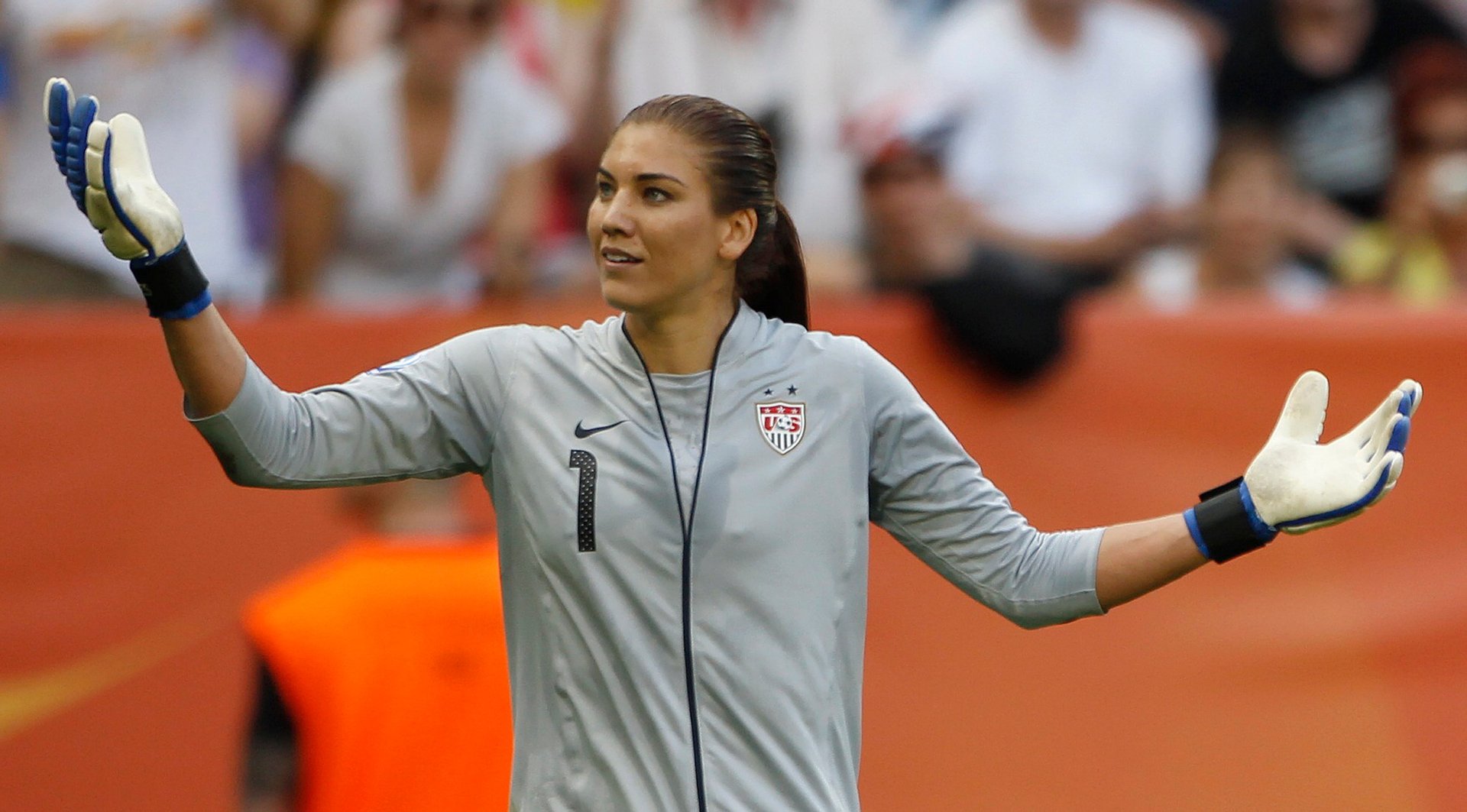Hope Solo is comfortable playing the anti-hero, and that’s rare for female athletes
Unpopular opinion: A part of me wants to like Hope Solo. The passionate, petulant goalie for the US women’s soccer team is being pilloried this weekend for calling the Swedish national team “cowards” following their upset win over America in the quarterfinals of the Rio Olympics. “We played a bunch of cowards,” the decorated keeper told reporters after the loss. “The best team did not win today. I strongly believe that.”


Unpopular opinion: A part of me wants to like Hope Solo. The passionate, petulant goalie for the US women’s soccer team is being pilloried this weekend for calling the Swedish national team “cowards” following their upset win over America in the quarterfinals of the Rio Olympics. “We played a bunch of cowards,” the decorated keeper told reporters after the loss. “The best team did not win today. I strongly believe that.”
The backlash, not surprisingly, was swift. USA Today called Solo “boorish” and an embarrassment to both her country and team: “Solo’s comments were befitting of neither an American star nor an Olympian. She ought never wear the US uniform again.” The Washington Post noted that this is probably the 35-year-old star’s last big international game, and “that’s probably for the best.” On social media, armchair commentators called her classless and garbage—and worse.
Hope Solo is America’s best goalkeeper—perhaps of all time. Unfortunately, her controversial conduct off the field garners almost as many headlines as her (usually) stellar play between the posts. Some of this criticism is warranted—Solo’s domestic violence history is especially troubling. And yet, there are plenty of star athletes who’s bad behavior rivals or surpasses hers. Luis Suárez, one of the best strikers in the world, has an annoying habit of biting opposing players on the field. Literally biting them. You won’t find fans calling for him to be kicked off FC Barcelona, or the Uruguay national team.
The world of sports is all about narratives. We love to sort athletes into categories: are you a hero, or a villain? The Olympics is a great example of this mythology in action—a true Olympian, the theory goes, is humble in victory and gracious in defeat. But there is also a third category of athletes, the anti-hero. Anti-heroes are allowed to be impolite, to speak their mind, to get a little rowdy. Anti-heros don’t give a flying fig what we think of them, and we secretly love them a little bit for it.
So what makes Luis Suárez an anti-hero and Hope Solo an unredeemable villain? Why is one a national hero, and another a national disgrace? It’s a complicated question, and I’m not here to compare the sins of one athlete against the misdeed of another. But I do think that we tend to judge women more harshly, especially when it comes to sportsmanship. Just as female soccer players have been urged to wear make-up during matches, female athletes are expected to be ladylike off the field as well. Don’t make a fuss, don’t get upset, don’t be angry or rude or “boorish.” (These expectations are not limited to athletes, of course. Similar standards continue to frustrate women in all aspects of public life, notably in the workplace.)
In 2014, Bleacher Report compiled a list of the 26 biggest anti-heroes in sports. Suárez was on the list, as was superstar boxer Floyd Mayweather, a man accused of assaulting five different women in the privacy of his own home but whose public pugilist skills brought in $300 million in 2015. Know how many women made the list? Two—Serena Williams and UFC champion Ronda Roussey.
Williams’ behavior over the years has raised its fair share of eyebrows—the tennis star’s penchant for colorful outfits and speaking her mind stands out in a sport historically known for its starched, white pleated skirts and filigreed fan base. And yet, she is also a beloved figure, partially due to her dominance but partially because her anti-hero status means fans have learned to accept her occasional outburst and chalk them up to confidence and a burning desire to win, politeness be damned.
Ultimately, Solo should not have called the Swedes cowards. Their strategy against the heavily favored US squad was a smart one—be conservative. It may not have made for explosive play, but it was tactically effective. But I also don’t think the reaction to her comments has been completely fair, either. In a follow-up interview, Solo noted that “Losing sucks. I’m really bad at it.” She’s not a hero, but she’s not garbage, either.
Women and young girls deserve role models they can look up to and emulate; Hope Solo is not that role model. But does she have to be? The world is full of incredible female role models, in sports and in life. And while there’s plenty of things that Solo has said and done in the past that I find reprehensible, I wonder how societal standards and gender stereotypes inform our disgust. If Solo was instead the best male goalkeeper in the world, would we be calling for his dismissal? Or would we, as we have time and time again for elite male athletes, forgive and forget. Because the best athletes in the world don’t always get there by playing nice, right? Except, perhaps, if they’re women.